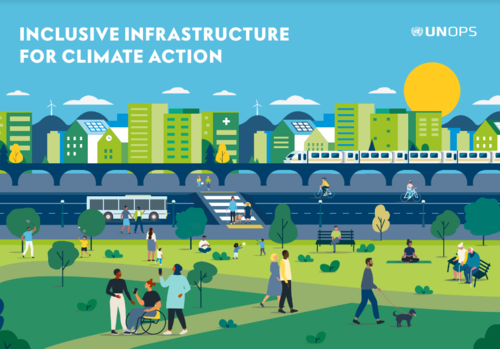New report calls for inclusive infrastructure in responding to climate crisis
Inclusive and rights-based climate action must be integrated into infrastructure development to support the Paris Agreement and Sustainable Development Goals, according to UNOPS latest research
- A new report by UNOPS finds that inclusive infrastructure influences the achievement of up to 88 per cent of the Sustainable Development Goals (SDGs).
- It calls for an approach to infrastructure that identifies and responds to marginalization, socio-economic inequalities and climate vulnerabilities.
- The authors propose five principles of inclusive infrastructure, and call for infrastructure that is equitable, accessible, affordable and empowering, while respecting the “do no harm” principle.
A new report, titled “Inclusive infrastructure for climate action”, has called for inclusive and rights-based climate action to be integrated into infrastructure development to support the Paris Agreement and Sustainable Development Goals (SDGs).
Published by UNOPS, the report features expert insights from 10 non-governmental organizations that work directly with marginalized people and communities across the world.
Based on these, it offers recommendations to develop infrastructure that is equitable, accessible, affordable, empowering and does no harm.
The report finds that inclusive infrastructure influences the achievement of up to 88 per cent of the Sustainable Development Goals (SDGs) and calls for an approach to infrastructure that identifies and responds to marginalization, socio-economic inequalities and climate vulnerabilities.
Speaking about the report, UNOPS Acting Executive Director Jens Wandel said:
“When infrastructure is inclusive, it empowers all people to have a good quality of life, fully participate in society and be more resilient to climate change impacts.”
According to the research, women and marginalized groups are estimated to make up more than 80 per cent of the global population and are therefore the majority of infrastructure users. Yet current infrastructure solutions, particularly in the context of climate change and climate disasters, fail to meet their specific needs.
By examining the barriers that many people face – including discrimination and social exclusion, physical barriers and lack of safety, prohibitive costs and requirements, limited access to information, and lack of access to decision-making – the publication identifies ways to mainstream inclusion in climate-compatible infrastructure development. This includes identifying 7 action areas and 24 recommendations that governments and other stakeholders can use to deliver inclusive infrastructure for climate action.
ENDS
Notes to the editors:
“Inclusive Infrastructure for climate action” will be launched on Friday, 11 November 2022, at the 27th Convention on Climate Change (COP27) in Sharm el-Sheikh, Egypt.
The launch will take place at the Climate Mobility Pavilion (P28 Blue Zone) at 18:00 - 19:30 (GMT+2) on 11 November.
To receive a copy of the report, please contact Tom Collins: tomco@unops.org / +45 4533 7708.
Members of the media are welcome to attend the launch of the report. To guarantee attendance please follow the registration instructions here.
There are opportunities to record and live-stream UNOPS-hosted events as part of COP27 coverage. Those seeking to do so are encouraged to contact the press contact directly.
The Climate Mobility Pavilion is located in Area B, Delegation Pavilions 3, Pavilion #P28. Area B is directly accessible via the adjacent Registration Area, where COP27 UNFCCC event badges are distributed to COP27 general participants. The Pavilion is located next to the Indonesian Pavilion, the SDG Pavilion and the Spain Pavilion.
Press contact details:
Tom Collins: tomco@unops.org / +45 4533 7708
About UNOPS
UNOPS mission is to help people build better lives and countries achieve peace and sustainable development. We help the United Nations, governments and other partners to manage projects, and deliver sustainable infrastructure and procurement in an efficient way. With decades of practical infrastructure experience, UNOPS is committed to supporting climate action and tackling the climate emergency.
Read more: www.unops.org
